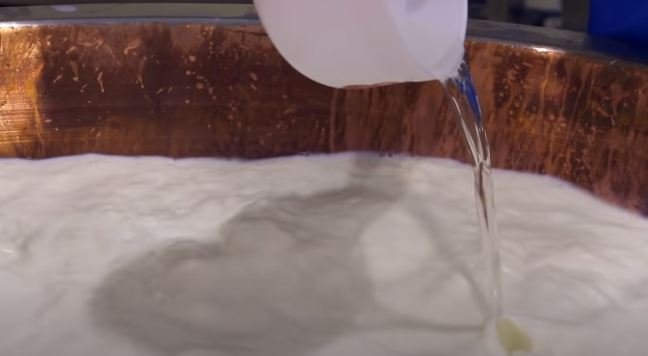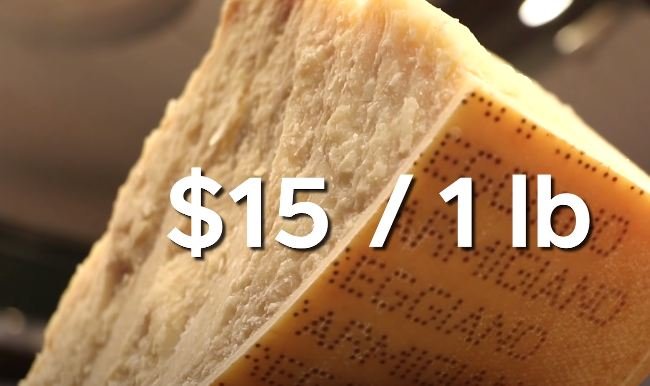When most people think of Parmesan cheese, they don’t think of much other than sprinkling it on their pasta or pizza. But did you know that Parmesan cheese is actually not vegetarian? For those of us who follow a plant-based diet, this can be a bit confusing. So why exactly is Parmesan cheese not considered vegetarian? In this blog post, we will discuss the reasons why Parmesan cheese is not considered vegetarian and what vegetarians can do to ensure that their food choices are still ethical. Read on to find out more about what is exactly Parmesan and why Parmesan cheese isn’t vegan-friendly.
What is Parmesan Cheese?
Parmesan cheese is a hard, granular cheese that is used for grating or shaving. It is usually made from cow’s milk, but can also be made from goat’s or sheep’s milk. The name “Parmesan” comes from the Italian city of Parma in the Emilia-Romagna region, where the cheese originated.

Parmesan cheese is made by separating the curds from the whey and then pressing the curds into wheels or blocks. The wheels or blocks are then soaked in brine (salt water) for several months, which gives the cheese its distinctive flavor. After this, the Parmesan is aged for two years or more.

Parmesan cheese has a strong, nutty flavor and a granular texture. It is commonly used as a topping on pasta dishes or on its own as a snack. Parmesan is also a key ingredient in many Italian dishes such as risotto and carbonara.
Why is Parmesan Cheese not Vegetarian?
Parmesan cheese is not considered vegetarian because it contains animal-derived rennet, which is an enzyme used to coagulate the milk during the cheese-making process. Rennet is usually obtained from the lining of the stomachs of young calves, which are commonly raised for veal or beef.
Vegetarian rennet, which is derived from microbial sources, is also available, but many producers still prefer to use traditional animal-derived rennet. Additionally, some vegetarian parmesan cheeses contain casein, a protein obtained from milk, which is also not considered suitable for a vegetarian diet.
What is rennet?
Rennet is a complex mixture of enzymes that is used in the cheese-making process to coagulate the milk. It is added to warm milk, which causes the milk proteins (casein) to clump together and form curds. The curds are then separated from the whey and used to make cheese.
Traditionally, rennet was obtained from the lining of the fourth stomach chamber of young calves, which are commonly raised for veal or beef. This type of rennet is known as animal rennet.

However, with the increasing demand for vegetarian and animal-free products, microbial rennet has become more popular. Microbial rennet is derived from certain strains of bacteria or fungi, and is considered to be suitable for vegetarians and vegans.
In conclusion, rennet plays a crucial role in the cheese-making process and its source (animal or microbial) can affect the final product’s suitability for different dietary restrictions.
How to store Parmesan Cheese?
When it comes to storing Parmesan cheese, there are a few things you need to keep in mind. First of all, Parmesan is a hard cheese, so it can last for a long time if stored properly. However, like all cheeses, it will eventually go bad. Here are a few tips for storing Parmesan cheese:

- Store Parmesan cheese in a cool, dry place. A refrigerator is ideal.
- Wrap the cheese tightly in wax paper or foil to prevent it from drying out.
- If you’re not going to use the cheese within a few weeks, you can store it in the freezer. Just be sure to thaw it slowly in the refrigerator before using it.
How Parmesan Cheese is made?
Parmesan cheese is a hard, granular cheese made from cow’s milk. The milk is first curdled with rennet, and then the curds are cooked and drained. The resulting whey is used to make ricotta cheese. The curds are then pressed and aged for at least 12 months. Parmesan cheese has a strong, nutty flavor and a crumbly texture.
How to grate Parmesan Cheese?
If you’re a vegetarian who loves cheese, you’ve probably wondered at some point whether Parmesan cheese is vegetarian. The answer is no, Parmesan cheese is not vegetarian.

Parmesan cheese is made from cow’s milk, and the rennet that is used to curdle the milk is derived from animal stomachs. While there are vegetarian alternatives to rennet, most Parmesan cheese makers still use traditional rennet.
So, if you’re a vegetarian who wants to enjoy Parmesan cheese, you’ll need to find a brand that uses vegetable rennet. Luckily, there are a few brands out there that make vegetarian Parmesan cheese. Once you’ve found a brand you like, grating your own Parmesan cheese is easy!
To grate Parmesan cheese, simply place the block of cheese on a large grater and run it over the coarse side of the grater. Grate as much or as little as you need for your dish.
Why Parmesan Cheese Is So Expensive?
Due to a number of variables, including its production method, scarcity, high demand, and superior flavour and quality, parmesan cheese is pricey. Hard cheeses like parmesan, which are created from raw cow’s milk and matured for at least 12 months, have a rich, nutty flavour. The production procedure is time-consuming and expensive because it calls for premium milk and old-fashioned methods. Furthermore, because Parmesan is a well-known and in-demand cheese with a little supply and great demand, the price has been driven higher.

Can you freeze Parmesan cheese?
Yes, you can freeze Parmesan cheese, but it may change its texture and flavor once it’s thawed. When parmesan cheese is frozen, the moisture in the cheese can expand and cause the cheese to become crumbly and dry. The flavor of the cheese may also become dull or change slightly.
It’s best to grate the cheese and store it in an airtight container or freezer-safe bag before freezing. You can also wrap the cheese tightly in plastic wrap or aluminum foil before freezing. To use the frozen Parmesan cheese, simply take it out of the freezer and let it thaw in the refrigerator. The cheese will still be safe to eat, but it may not be as flavorful or as creamy as fresh Parmesan cheese.
Fact about Parmesan cheese

In conclusion, while you can freeze Parmesan cheese, it may not retain its optimal texture and flavor. If possible, it’s best to use fresh parmesan cheese for best results.
Calories in Parmesan cheese
Depending on the brand and serving size, Parmesan cheese has a range of calories. A portion of Parmesan cheese weighing 1 ounce (28 grammes) typically has 114 calories. Additionally in this serving size are:
1. Protein in 7.8 grammes
2. A 9 gramme fat
3. carbs in 0.9 grammes
4. Sugar content: 0.7 grammes
5. fiber of 0.7 grammes
Parmesan cheese should be consumed in moderation as part of a balanced diet because it is heavy in sodium and fat. It’s a good idea to check the nutrition label for particular information because the calorie and nutrient content of parmesan cheese can also vary depending on the brand and whether it’s grated or in a block form.
Parmesan Crusted chicken recipe
Parmesan crusted chicken is a delicious and easy way to dress up your chicken. It’s a great recipe for a weeknight meal or for entertaining. The key to this recipe is to use good quality Parmesan cheese. I like to use shaved Parmesan, but you could also use grated Parmesan.

To make the crust, you will need:
-1/2 cup Parmesan cheese
-1/4 cup all-purpose flour
-1 teaspoon garlic powder
-1/4 teaspoon salt
-1/4 teaspoon black pepper
-2 tablespoons olive oil
-4 boneless, skinless chicken breasts
Instructions:
1. Preheat oven to 400 degrees F (200 degrees C).
2. In a shallow bowl, combine Parmesan cheese, flour, garlic powder, salt, and pepper. Place chicken in the mixture, one at a time, and coat evenly.
3. In a large skillet over medium heat, heat olive oil. Add chicken and cook for about 3 minutes per side, until golden brown.
4. Transfer chicken to a baking sheet and bake for 12 minutes, or until cooked through. Serve immediately.
Bottom Line
There are alternatives to animal-derived rennet, such as microbial rennet, which is derived from microbial sources and can be used to make vegetarian parmesan cheese. However, not all Parmesan cheese manufacturers use these alternatives, so it’s important to check the ingredients or contact the manufacturer if you’re seeking a vegetarian version of this cheese.

When considering adding Parmesan cheese to your diet, it’s also important to keep in mind that it can be high in sodium and fat, and should be consumed in moderation as part of a balanced diet.
